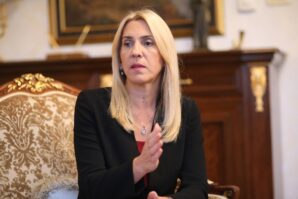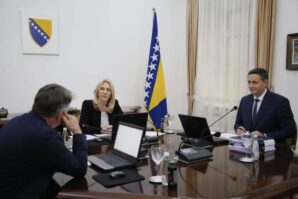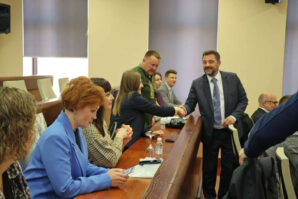Bosnia-Herzegovina is a country of few opportunities for young people. Many of them, unable to see the potential for prosperous employment and financial stability decide to look for a better future outside of the country. Some of the most talented ones find the opportunity they were looking for through an unusual high school located in the hills of Herzegovina.

By: Maida Salkanović
Two years ago, Lejla Krečinić, then a 16-year-old, was going to a high school in her hometown Jablanica, when she heard of an unusual school in an hour-away town of Mostar. The name of the school was United World College and it was an international school where a chosen few 16 to 18 year-olds from Bosnia-Herzegovina and other 47 countries came together on a scholarship to study for the last two years of high school. The school seemed interesting because it had students from all over the world, including countries such as Afghanistan, Belarus, Brazil, Israel, Palestine, and even North Korea, so she decided to find out more.
What she found out was that the study program was hard, but it was recognized in most countries of the world. Best of all seemed the fact that after graduating from this school, she could go on to a university anywhere in the world. Most of the students coming from this school get scholarships for prestigious universities in the United States. According to the school’s official data, 288 out of 422 students from classes 2008-2013 went on to continue their education in the United States, including 186 students coming from Bosnia-Herzegovina. Some others went to universities in other countries in Europe, such as the United Kingdom or Austria.
.
 After hearing all of this, Krečinić decided to apply and got in, mostly based on her academic merit and potential and previous commitment to community work, as well as other activities she undertook in her high school. Today, Krečinić is in her final year of high school, and is now choosing which universities to apply to. Like most of those in a similar situation, she is not considering any universities in BiH, but is mostly inclined to schools in Scandinavia, and the States. As she says, money is important, so she will most likely choose a university in the States, because they offer full scholarships to the students from this school.
After hearing all of this, Krečinić decided to apply and got in, mostly based on her academic merit and potential and previous commitment to community work, as well as other activities she undertook in her high school. Today, Krečinić is in her final year of high school, and is now choosing which universities to apply to. Like most of those in a similar situation, she is not considering any universities in BiH, but is mostly inclined to schools in Scandinavia, and the States. As she says, money is important, so she will most likely choose a university in the States, because they offer full scholarships to the students from this school.
The United World College (UWC) in Mostar is part of the bigger UWC movement, which is comprised of 14 schools in 14 different countries. These schools all operate under International Baccalaureate (IB) academic program, and they all share a program of extracurricular activities called CAS (Creativity, Action, Service), in which the students are required to do a certain number of hours doing creative, physical, or community service activities. Besides that, they all share a common set of values, such as international and intercultural understanding, celebration of difference, and personal responsibility and integrity.
The UWC in Mostar was opened in 2006, as an effort of establishing a UWC in a post-conflict area, and it served as an initiative for an educational system in which students from all parts of BiH, regardless of their ethnicity and nationality, would attend school together. In its first year, the College offered 64 scholarships to the students from Bosnia-Herzegovina, irrelevant of their place of residence, ethnicity, or nationality.

United World College in Mostar
The mission of the College was especially important in Mostar, a city divided between Bosniaks and Croats. It was decided that UWC would use some space in the building of the Mostar Gymnasium, destroyed during the war and reopened afterwards. The building of the Gymnasium is placed on the Spanish Square, which was the dividing line during the war, and is currently forming a part of the invisible border separating the city into two parts: the Bosniak and the Croat part. Like the city, the Gymnasium itself is divided: there are Bosniak and Croat students attending two different curricula, and then there are UWC students who have the International Baccalaureate curriculum. Because of its specific situation, UWC has a special role in the BiH society, and it states as one of its aims “To equip the next generations of young people in Bosnia and Herzegovina with the knowledge, skills, leadership qualities and international values, necessary to bridge the still existing ethnic divisions and move their country into the 21st century.” However, bad economic situation, high rate of unemployment, and impossiblity of professional fulfilment drive young UWC graduates out of Bosnia-Herzegovina.
Considering the six classes that graduated 2008 to 2013, 186 out of 263 students coming from BiH decided to go to university in the United States. Only 46 students from these classes stayed to study in Bosnia-Herzegovina. The number of students deciding to stay gradually declined, so it went from 24 from the class of 2008 to zero in the class of 2013.

Marjana Tomaš, UWC university adviser explains that with the deterioration of the economic conditions in the country. “It all depends on the money, in the end. Often times they really want to stay in Europe, to be closer to home, but the scholarships in Europe do not cover accommodation and food, whilst in the states that is the case.” Some students, says Tomaš, could not afford to go to university in BiH, so getting a scholarship from a US university is their best chance at getting education.
One of the students who used that chance is Samra Mrković from Doboj-Istok. After graduating from UWC in Mostar, she got a scholarship to study microbiology and chemistry at the Methodist University in North Carolina. After she graduated from university, Mrković got a job of laboratory technician at the Eton Science DNA analysis company. As she says, she is not planning on returning to BiH, and as the main reason she lists the lack of job opportunities. ”Opportunities for employment are more or less nonexixtent, and on top of that corrupt. I am not planning on joining a political party or giving money to get a job if somewhere else they actually appreciate how much and what I know.” says Mrković. ”
Out of 26 UWC graduates contacted for the purpose of this research, twenty-one, including Mrković, were not in Bosnia-Herzegovina at the moment. Out of those 21, only three said they were planning on coming back to BiH. Most of those 18 students who said they were not planning on returning stated the same reasons for their decision: bad economic situation, inability of finding a job, bribe and corruption in the employment sector.
UWC students are just a small sample of the young, well-educated BiH population, who all state similar things. According to the World Bank estimate, 28.6% of the tertiary educated population of BiH leaves the country to study or work somewhere else. In the United States alone, each year there are around 250 undergraduate students from BiH studying there.

The reasons young educated people leave BiH are mostly of financial nature. With youth unemployment reaching almost 63% in 2012, Bosnia-Herzegovina is the leading country in Europe in that regard.
Part of that unjoyful statistical figure is Vedran Pobrić, another UWC graduate. After graduating from UWC, Pobrić went on to study geology at the University of Florida. After graduating from university, he came back to BiH. As he says, his expertise was not yet recognized in this country. ”My references and education have not yet been so useful in my job search in BiH. Geology is underappreciated in BiH, although it should be in top 5 sciences, as it has the resources to bring change to this measley, nonfunctional economy” he thinks.
Marjana Tomaš, UWC university adviser, says that she has witnessed situations in which UWC alumni came back to BiH after graduating from university, full of enthusiasm to apply their newly-acquired knowledge in their own country and ready to change things. However, after they face barriers everywhere, such as corruption and nepotism, as well as the general atmosphere of apathy, their enthusiasm wears off. ”At one moment, they realize that they’re fighting windmills and they simply give up” she says.
Young Lejla Krečinić does not plan to be one of those people. She does not want bad economic situation, corruption and nepotism, which form a part of everyday life in BiH to be a part of her life as well. Although she would like to be close to home, examples of young people in her environment trying and failing to find employment have made her skeptical of a possibility of a better future in this country. ”Once I leave, I am not planning on coming back’’, she concludes.
This story was created as part of the educational program “Data Camp: Data Journalism and Open Data Training”, which was organized in the framework of the “Public Data Now!” program, implemented by the Foundation Mediacentar Sarajevo, Center for Social Research Analitika and European Journalism Center. The program is being implemented with support of the MATRA program of the Embassy of the Kingdom of Netherlands in Bosnia-Herzegovina.
















